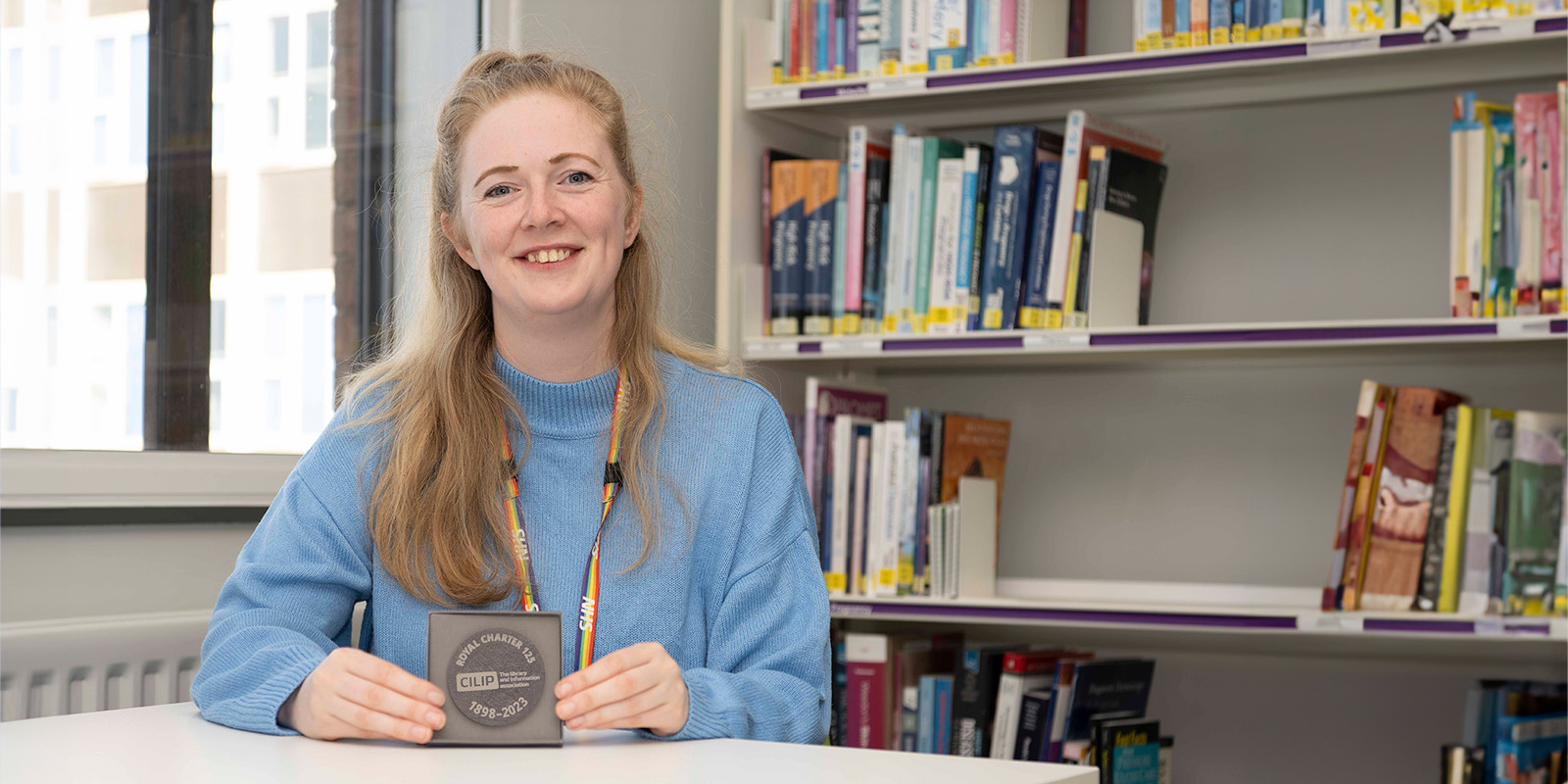
Emily Johnson Deputy Knowledge Manager at University Hospitals Birmingham NHS Foundation Trust. In 2023 she was lauded as a member of the CILIP 125.
Emily's career path to becoming Deputy Knowledge Manager at University Hospitals Birmingham NHS Foundation Trust has had its twists, and now she uses a formidable range of skills and experience to lead a rewarding professional life.
“I studied English at university and wanted to do something kind of connected to the subject, so became an English teacher. I realised my passion was in reading and interacting with the kids, and not so much the teaching, so I took
my first job as a library assistant.”
Everyone needs a bit of luck
Luck (or coincidence) got her the next step in her career when she saw an ad for a library assistant in a mental health hospital.
“I thought the role was for a librarian to the patients, and I was surprised to learn that it was for the staff! The NHS offered me a development position to learn on the job, which I then followed up with a masters, and
that’s how my career in Health Libraries began.”
Emily now oversees the libraries and knowledge management of four NHS trusts in Birmingham, and she takes her biggest challenge so far as just another opportunity for career development and growth.
“I worked four days a week on a project to merge 50 separate library management systems (LMS) for NHS England, while staying in post in my current position.
“The project had a steep learning curve that demanded a range of new skills and knowledge. I had to learn the nitty gritty of library policy, and also work with roomfuls of librarians to bring them all on board
with the new system and reach consensus on a set of core rules.
“I really learned to listen to different points of view and recognise that often people are talking about a separate issue that is important to them.”
The rewards that new challenges bring
The challenges seem to make the job more rewarding, but Emily is keen to point out that at its core, being a health librarian is about supporting people through healthcare librarianship and knowledge
management.
“The day job is really to support doctors, nurses, clinicians, we can be asked to pull out several articles on clinical questions at a time, which helps the doctor make their decisions, and this
fundamentally helps the patients.
“We also champion evidence-based decision making that influences the bigger context of the NHS, to save trusts money, support management, policy making, and create a space for student nurses,
medical students, and apprentices.”
Professional growth is about helping others
Emily has found the career process rewarding every step of the way, learning and growing. In her current leadership role, she finds satisfaction in helping others to follow their
own upwards trajectories.
"I like to develop people and bring people along with me. When someone moves up the progression ladder, there’s a chance for everyone to shift upwards.
"We are one of the younger teams in the midlands, and we try to engage people on this new path from the beginning, to bring in new apprentices and give everyone a sense of
progression”
CILIP: often the key ingredient
CILIP has been a part of Emily’s career journey from the beginning. As library assistant she completed her ACLIP, and during her Masters she recognised there was a
lot of transferable knowledge, so she took on chartership.
“My chartership mentor was from a different sector and this new perspective brought insights that have made a real difference on my work.
“We visited a public library as I was interested in their role in healthcare, but was struck by how public libraries ogranise community groups and how they
make their spaces welcoming.
“Our libraries now don’t just stock medical and clinical works, we also have fiction collections, well-being books, to create a space that is also a rest
space and caters to the wider workforce, such as cleaners and electricians.”
Emily gained actionable insights through using CILIP’s PKSB tool to identify knowledge gaps and areas of growth, but earning professional registration
also helped to fill in the missing puzzle-pieces of the bigger picture, and opened the door for Emily’s high-level career progression.
“In healthcare, nurses have to do a big revalidation piece to gain their professional registration, so why not librarians? We consider ourselves
professional, and often remind people of that, and chartership helps you to see yourself as a professional, and you learn how to hold yourself
to account.
“Attaining chartership is completely different from just turning up to work. It creates professional awareness that makes career progression
smoother. It teaches you to look around and see what other people are doing, so that you can recognise what you need to keep moving forwards."
The next steps for Emily
Looking to the future, Emily will be establishing herself further in her Deputy Knowledge Manager Role and searching for new opportunities
for professional growth.
“I have only been in post for a year and there is still lots that I want to do to develop the service at my trust. I am also completing
the NHS Leadership Academy’s Elizabeth Garrett Anderson program which is developing my leadership skills and understanding
of management and leadership in healthcare more broadly.
“I might also consider the CILIP Fellowship as the last few years have given me a lot to reflect on.”
Find out more about membership
Get out of the professional doldrums and find out more about how CILIP membership can help you find a new direction
in your career. Get in touch with our sales manager Abbie now.



